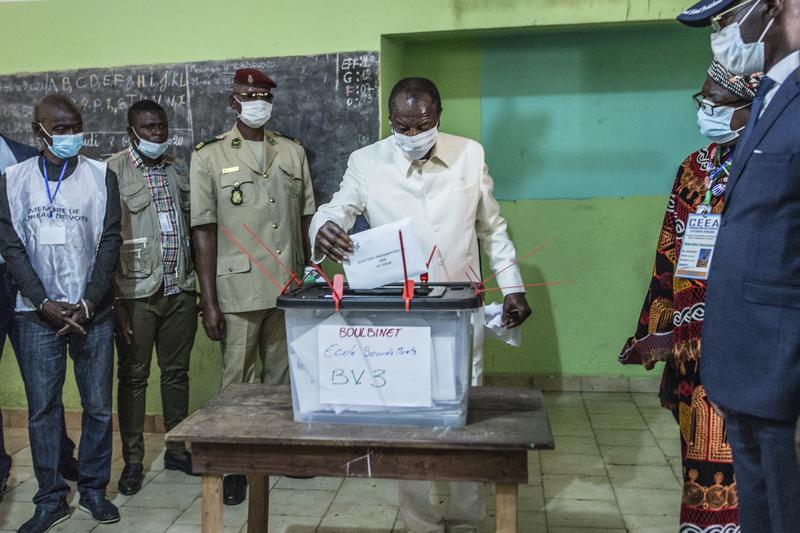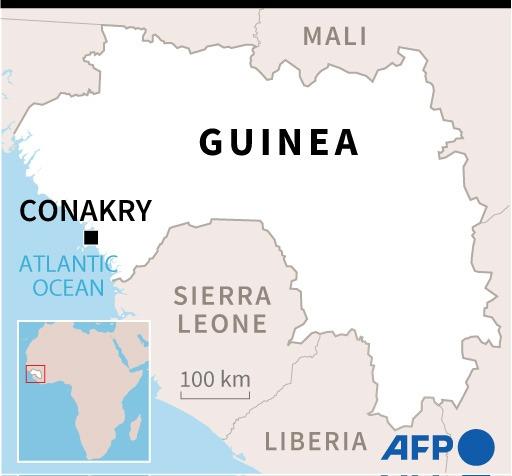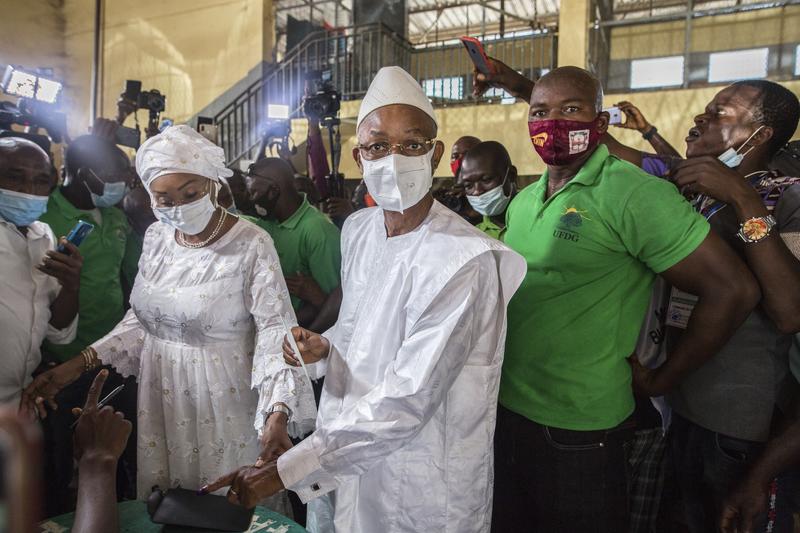 Guinean President Alpha Conde casts his ballot in Conakry, Guinea, Oct 18, 2020. (SADAK SOUICI / AP)
Guinean President Alpha Conde casts his ballot in Conakry, Guinea, Oct 18, 2020. (SADAK SOUICI / AP)
CONAKRY - Polls closed and counting began in Guinea on Sunday evening following a largely peaceful day in which voters decided whether to give 82-year-old President Alpha Conde a third mandate, made possible by a constitutional change in March.
The election comes at a delicate moment in West Africa, where concerns are growing over a reversal of democratic gains. In August, Mali’s government was overthrown by the army, while in Ivory Coast, months of protests against President Alassane Ouattara’s bid on Oct 31 for a third term have turned violent
At least 50 people have been killed over the past year during demonstrations against the new constitution, according to Amnesty International, and violence erupted repeatedly during campaigning.
A spokesman for the national election commission said the vote was “calm, serene and done with enthusiasm”, but a number of people including one of the candidates said they had been turned away at polling stations because of problems with their voter cards.
The election comes at a delicate moment in West Africa, where concerns are growing over a reversal of democratic gains. In August, Mali’s government was overthrown by the army, while in Ivory Coast, months of protests against President Alassane Ouattara’s bid on Oct 31 for a third term have turned violent.
ALSO READ: Mali coup fans fears of West African democracy backslide
Conde faces 11 challengers, including longtime rival Cellou Dalein Diallo, a former prime minister who finished second to Conde in elections in 2010 and 2015.
While no reliable opinion polls are available, many political analysts expect Conde to prevail after he won overwhelming approval for the new constitution in a referendum in March - although that vote was boycotted by the opposition.
The commission will announce provisional results within three days of receiving the last polling-station tally. The Constitutional Court will then have eight days to declare a winner.

In the west of Guinea’s capital, Conakry, dozens of voters queued quietly to vote in a primary school where the exterior was plastered with posters of Conde.
“I hope that things will happen in peace,” said Mariama Camara, a housewife.
But across town in the Koloma Soloprimo neighborhood, an opposition stronghold, several voters told Reuters they had been unable to participate because of voter-card problems.
“When I arrived at the polling station, I was told my card was not valid,” said resident Fatoumata Barry.
‘A holy mess’
After casting his vote, Diallo said he was worried that Conde would steal the election with “cunning and violence”.
“We will not accept (that),” he said.
 Guinean opposition leader Cellou Dalein Diallo votes in Conakry, Guinea, Oct 18, 2020. (SADAK SOUICI /AP)
Guinean opposition leader Cellou Dalein Diallo votes in Conakry, Guinea, Oct 18, 2020. (SADAK SOUICI /AP)
One of the candidates, former Foreign Minister Makale Camara, said she herself had not received a voter card and so had been unable to vote.
“That’s totally unacceptable because there are people who ended up with three or four cards,” she told Reuters.
“It’s a holy mess they’ve organized there. If there can be ‘fictitious’ citizens, a candidate cannot be fictitious.”
ALSO READ: Guinea holds contentious referendum despite coronavirus outbreak
Conde, who has described the constitutional reform that allowed him to run again as fair and democratic, says he needs more time to finish major mining and infrastructure projects in the West African country.
“Guinea cannot develop if there is no peace, security and unity. We do not want violence,” he said after casting his ballot at the Boulbinet primary school in Conakry.
“Those who want to challenge the results must do so within a legal framework, with recourse to the Constitutional Court,” he added, flanked by bodyguards.
READ MORE: Building a better Africa
Guinea has made progress developing its mineral riches, including bauxite and iron ore, and gross domestic product has doubled during Conde’s presidency. But many Guineans complain the mining boom has not ended frequent power cuts and unemployment.
In response to Reuters’ question about potential voting irregularities, election commission spokesman Mamadi 3 Kaba said: “Only cards distributed over the last 30 days are valid.”



